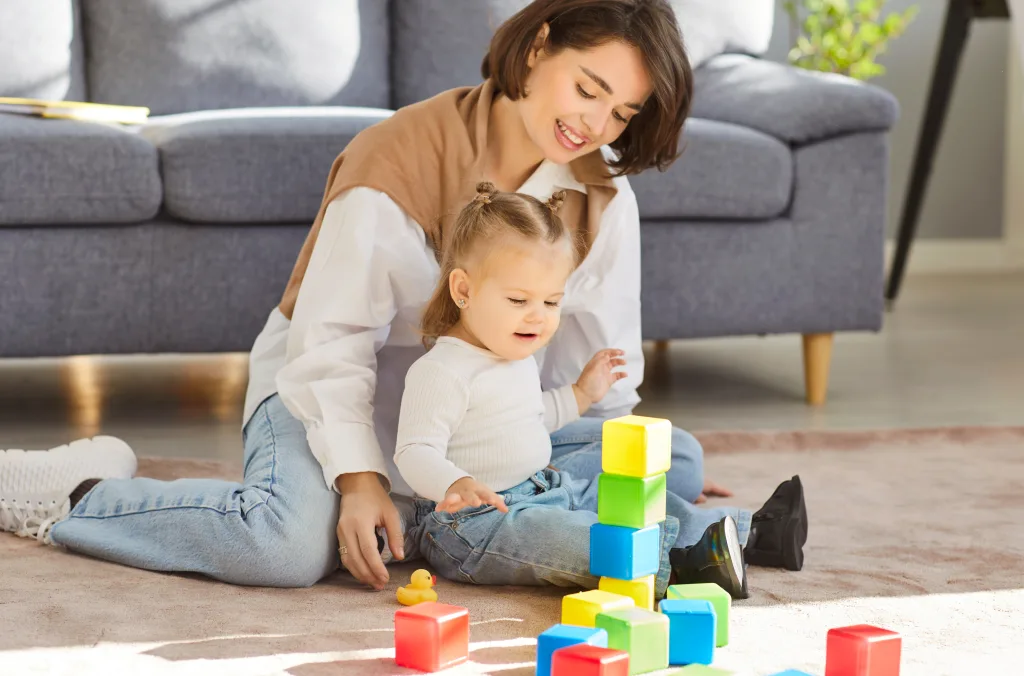When families contact us about hosting an Au Pair, one of the first questions we get is about their duties. Can Au Pairs help with house cleaning? Making meals?
Right off the bat, let’s clear that up: no. Au Pairs handle child-related tasks only. They’re not housekeepers, pet sitters, or chefs. But when it comes to caring for kids, what does that actually include?
The answer depends on your child’s age. The needs of a newborn look very different from those of a middle schooler. Let’s break down what Au Pair support looks like across stages, from infants to teens.
Au Pair Duties for Infants (0-1 Year)
Everyone knows that babies require lots of care and attention. Their world is small but full of routines and changes, like learning to recognize voices, responding to faces, plus plenty of feeding, napping, and diaper changes. For parents, the early months also come with sleep schedules, developmental milestones, and plenty of trial and error.
At this stage, an Au Pair can help with:
- Bottle feeding or warming up breast milk
- Sterilizing bottles or pacifiers
- Diaper changes and basic hygiene
- Preparing and organizing baby supplies
- Supervising tummy time and playtime
- Helping maintain a nap schedule
- Reading, singing, and talking to encourage early development
- Keeping the nursery tidy and organized
Since every baby’s needs are unique, clear communication helps the Au Pair follow your family’s rhythm and support your baby’s growth the way you want.

Au Pair Duties for Toddlers (1-3 Years)
As babies turn into toddlers and start walking, talking, exploring, and testing limits, everything speeds up. This is a stage full of big emotions, rapid learning, and movement. While toddlers crave independence, they still need lots of supervision and structure.
An Au Pair can help toddlers with:
- Supervising active play and outdoor time
- Helping create or supervise a toddler care chart
- Preparing simple meals and snacks
- Helping with potty training and hygiene routines
- Reading books, singing songs, and encouraging language development
- Supporting early learning activities like puzzles, drawing, and stacking blocks
- Organizing and tidying up play areas
- Helping maintain consistent nap and bedtime routines
Host families can share development goals, like improving language skills or supporting potty training, so the Au Pair can stay aligned with the child’s needs.
Au Pair Duties for Young Children (4-10 Years)
Once kids hit school age, their schedules shift with school, homework, activities, and playdates all stacking up fast. Children this age are learning to juggle more responsibility, but need plenty of support behind the scenes from their parents and caregivers
At this stage, Au Pair duties might include:
- Handle school drop-off and pick-up
- Supervise homework and school projects
- Prep lunches and after-school snacks
- Organize creative play, arts, crafts, and outdoor games
- Support reading practice and learning activities
- Maintain routines for hygiene, screen time, and bedtime
- Keep toys, supplies, and personal spaces in order
The more host families share about school expectations, hobbies, and routines, the easier it is for the Au Pair to stay aligned and involved in your child’s daily life.

Au Pair Duties for Tweens & Teens (11+ Years)
Tweens and teens might not need help tying their shoes, but they still benefit from having steady support at home. School gets tougher, social lives get busier, and schedules get packed with sports, activities, and commitments that keep everyone busy.
Depending on your family’s routine, an Au Pair may:
- Drive kids to school, practices, and extracurriculars
- Help manage homework schedules and study habits
- Prepare after-school snacks or simple meals
- Be home after school to supervise
- Reinforce daily routines for chores, hygiene, and study time
- Model respectful communication and positive behavior
- Keep personal and shared spaces organized
As tweens and teens grow, goals change quickly. Keeping your Au Pair in the loop helps everyone stay on track and gives your child steady support along the way.
Tips for Host Families with Multiple Age Groups
When your kids span different ages, routines get more layered because infants, toddlers, school-aged kids, and teens all need different kinds of care. Having an Au Pair who can adapt to each child’s stage brings flexibility, but a little extra planning helps things run even smoother.
A few helpful things to keep in mind:
- Start with a clear schedule that covers each child’s daily needs, from feedings and naps to school pick-ups and activity drop-offs.
- Talk openly with your Au Pair about how responsibilities might shift depending on the day or which child needs more attention.
- Create a list of family priorities, like supporting your toddler’s potty training while also making sure your teen gets to soccer practice on time.
- Build in flexibility. Some days may be more infant-focused, others may center around school routines or extracurriculars.
- Check in regularly. As kids grow, routines change, so ongoing conversations help your Au Pair adjust to new stages and challenges.
- Don’t hesitate to raise concerns early. The more your Au Pair understands your expectations and needs, the easier it is to stay on the same page.

Find the Right Au Pair for Any Age Group
Every family runs a little differently, but having an Au Pair can help you navigate the day-to-day demands as your kids grow and change. What starts with diaper changes and nap schedules eventually shifts into homework help, school drop-offs, and busy calendars filled with sports and activities. An Au Pair can become part of this flow at every stage, adjusting to your family’s needs.
Through it all, the most critical piece is communication. When you share your routines, priorities, and any changes that come up, your Au Pair can step in where needed and give steady, reliable care that works for your household. With the proper support, you gain flexibility, peace of mind, and an extra set of hands to help keep everything and everyone going, no matter your family’s schedule.
Experience the benefits of affordable, personalized childcare. Find an Au Pair today and build the support your family needs.



